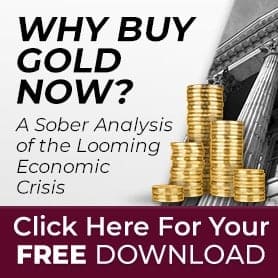- I am recording this podcast from New Orleans, where I am attending the Investment Conference
- Today, I am going to talk predominantly is the FOMC statement that came out yesterday following the conclusion of their 2-day October meeting
- It was largely expected that the Fed would not raise interest rates in October and that’s exactly what happened
- I predicted this a long time ago
- What is amazing is that, as a result of this announcement, more people expect the Fed to raise rates in December
- Going into this announcement, the dollar was on the defensive, silver was up about .50, gold was up $15.00
- It sure looked like people were expecting a more dovish tone from the Fed
- After all, a lot of bad economic news has come out since the September meeting
- When the Fed statement was released, there was no such change in language
- This now leads people to believe that the statement was hawkish
- They still don’t understand the game: Nothing has changed.
- the Fed has to pretend that a rate hike is right around the corner in order to pretend that the recovery is real
- They can’t admit that the economy is weak because they want to take credit for saving the economy
- They have to keep pretending, and they have to keep making up excuses
- Steve Leesman was asking why we need emergency rates when the emergency is over
- The emergency is not over, as far as the Fed is concerned because there is no real recovery
- If we had a legitimate recovery, of course the Fed could raise rates
- Thus the game: they continue to talk as if they might raise rates, and the markets buy it
- As soon as their statement came out, gold tanked, it ended up down about $10, silver gave up most of its gains, and the dollar was broadly higher
- If you actually read the statement, there is nothing hawkish about it
- It is basically the same as the September
- The only thing that stands out is an absence of concern
- The FOMC is not worried about all the bad news
- “In determining whether it will be appropriate to raise the target range at its next meeting, the Committee will assess progress–both realized and expected–toward its objectives of maximum employment and 2 percent inflation. This assessment will take into account a wide range of information, including measures of labor market conditions, indicators of inflation pressures and inflation expectations, and readings on financial and international developments. The Committee anticipates that it will be appropriate to raise the target range for the federal funds rate when it has seen some further improvement in the labor market and is reasonably confident that inflation will move back to its 2 percent objective over the medium term. “
- None of that is going to happen. The labor market is deteriorated – the labor force participation rate is still shrinking
- These are metrics Janet Yellen needs to see improve
- The Fed knows that these minutes will be misinterpreted
- They want to preserve the illusion that a rate hike is possible so they can preserve the illusion that this is a legitimate recovery and not a gigantic bubble
- But, what’s going to happen when the Fed doesn’t raise rates and ends up launching QE4 the Fed is going to have zero credibility
- The U.S. economy is in worse shape now than it was leading into the 2008 financial crisis
- Now everybody is talking about how important the jobs number will be – the Fed has not raised rates in 7 years. How can one jobs report make the difference?
- Meanwhile we’ve had months of stronger jobs numbers and the Fed did not raise rates
- I think the truth is the Fed has decided not to raise rates
- But they still need to maintain the perception that they might raise rates and that’s the only explanation for the Fed’s rhetoric
- Now let’s get into this week’s data, including today’s release of Q3 GDP numbers
- They were looking for 1.7%, which is a sharp slowdown from the Q2 3.9% GDP number
- This one came out at 1.5%, slightly below estimates
- Part of the reason for the slowdown is that inventories are weighing on GDP
- The deflator came in lower, which “manufacturing” more economic growth
- This weak number shows a substantial decline, throughout this supposed recovery, Q4 has generally been weaker than Q3
- I think this year could have the slowest GDP of the entire “recovery”
- Next year is an election year
- Is the Fed going to sit by and watch the Obama “recovery” unravel in his last year?
- There is no way Janet Yellen can allow that. What will the Fed do in an election year with a slowing economy?
- Let’s look at the economic data that came out earlier in the week:
- Monday new home estimates got crushed. 549,000 were expected and we got 468,000
- Even worse, last month’s were revised down
- The housing market was one of the bright spots of the economy and now it is starting to dim
- Also, this morning we got the release of September Pending Home Sales
- Last month was down; analysts were expecting a rebound of 1% in September – instead we got a 2.3% decline
- Now we have back to back declines in pending home sales, an indication that the housing market is softening
- Talk of interest rates is cooling off the housing market
- The Fed will ultimately come to the rescue of the housing market, the stock market and the rest of the bubble economy with QE4
- On Monday, Dallas Fed Manufacturing came out, was expected to be bad and it came out even worse
- Last month was -9.5 – they were looking for an improvement to -6%. We actually got -12.7%
- On Tuesday we got Durable Goods – also expected to be bad – down 1%, following down 2% from the prior month
- Instead we got -1.2% which is down from the previously downward adjusted number
- All the economic news this week has been bad, yet the Fed does not acknowledge any of this data in its statement
- The Fed is trying to influence the psychology of the markets by ignoring bad news and hinting that an interest rate hike is still possible
- If Janet Yellen ever expressed concern over a recession, people would make decisions to avoid risk, which she does not want
- The Fed does not care about the consequences the individual investor or trader faces, they care about postponing the onset of the recession
- When the recession comes, the Fed will be charged with saving the economy from an outcome they claim they did not even see coming
- How can the Fed solve a problem it doesn’t even understand?
- This time, I think the Fed will lose credibility, because it has gone so far out on a limb by continuing to hint at rate hikes, that when it finally has to resort to stimulus, how can it have any credibility left?
Podcast: Download










